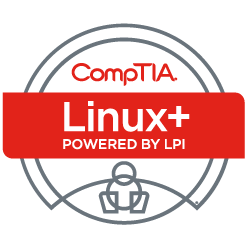Course Description & Overview
SecureNinja’s CompTIA Linux+ (XK0-006) certification training equips learners with the skills needed to confidently manage, troubleshoot, and secure Linux systems in real-world enterprise environments. This comprehensive course explores the fundamentals of Linux command-line usage, system administration, network configuration, security practices, and automation through tools like Bash and scripting utilities. It is aligned with the latest CompTIA Linux+ exam objectives and reflects modern job roles and technologies used in cybersecurity, DevOps, and cloud-based environments.
Covering everything from system configuration and command-line operations to automation, security, and containerization, this certification equips students with practical knowledge of Linux infrastructure across hybrid cloud environments. This training is an excellent step toward mastering open-source platforms while preparing to earn a vendor-neutral certification that is recognized by employers and meets DoD 8140 compliance requirements.
Why Choose CompTIA Linux+
- Widely Recognized Credential: Validates Linux skills in real-world enterprise environments.
- Updated for XK0-006: Covers emerging technologies such as containerization, automation, and orchestration.
- Vendor-Neutral Training: Prepares learners to work across multiple distributions and platforms.
- In Demand by Employers: Meets DoD 8140/8570 requirements and is highly valued in DevOps, cybersecurity, and system admin roles.
Topics Covered
- System Management: User and group administration, storage management, and configuration.
- Security: File permissions, access controls, and network security tools.
- Scripting and Automation: Shell scripting, task scheduling, and version control.
- Containers and Orchestration: Managing containers and Kubernetes basics.
- Troubleshooting: Diagnosing and resolving system and network issues.
Who is it for
- IT Professionals: Those seeking to validate or enhance their Linux skills.
- System Administrators: Professionals responsible for deploying and managing Linux-based infrastructure.
- Cybersecurity Analysts: Those who use Linux in penetration testing, threat detection, or server hardening.
- DevOps and Cloud Engineers: Anyone working with automated environments and cloud-native platforms.
Who Would Benefit
- Junior to Mid-Level Admins: Looking to formalize and expand their Linux experience.
- Network Engineers: Who want to enhance their understanding of Linux-based systems.
- Certification Seekers: Individuals pursuing DoD 8140 compliance or career advancement in IT infrastructure roles.
Prerequisites
Basic familiarity with computer systems and networking is recommended. Prior experience with Linux is extremely helpful but not required.
Course Outline
1. System Management
- User, group, and permission management
- Disk partitions, volumes, and file systems
- System startup and service management
2. Security
- Access controls and authentication mechanisms
- Firewall and intrusion detection configuration
- Log management and auditing
3. Scripting, Containers, and Automation
- Shell scripting and command-line tools
- Version control using Git
- Managing containers with Docker and basic Kubernetes
4. Troubleshooting
- Resolving boot, network, and permission issues
- Performance monitoring and diagnostics
- Analyzing logs and system messages
5. Hardware and System Configuration
- Installing and configuring Linux systems
- Kernel modules, services, and software packages
- Virtualization and cloud integration concepts
Course Length
- 5 Days
- 40 Hours
Exam Details
- Exam Code: XK0-006
- Number of Questions: Maximum of 90
- Question Types: Multiple-choice and performance-based
- Test Duration: 90 minutes
- Passing Score: 720 (on a scale of 100–900)
The CompTIA Linux+ XK0-006 certification is ideal for individuals who want to build or validate their Linux administration skills across multiple job roles. Whether you're advancing your career in system administration, cybersecurity, or DevOps, this course provides the practical foundation to support and manage modern Linux environments with confidence.
 Linux+ Course Info. Linux+ Course Info.
|
|||||
|---|---|---|---|---|---|
| Start Date | End Date | Location | Days | In Person | Online |
| Apr. 06, 2026 | Apr. 10, 2026 |
San Diego, CA
Pacific Time |
Mon-Fri (5 Days) |
Register | Register |
| May. 04, 2026 | May. 08, 2026 |
Alexandria, VA
Eastern Time |
Mon-Fri (5 Days) |
Register | Register |
| Jul. 20, 2026 | Jul. 24, 2026 |
San Diego, CA
Pacific Time |
Mon-Fri (5 Days) |
Register | Register |
| Aug. 17, 2026 | Aug. 21, 2026 |
Alexandria, VA
Eastern Time |
Mon-Fri (5 Days) |
Register | Register |
| Oct. 05, 2026 | Oct. 09, 2026 |
San Diego, CA
Pacific Time |
Mon-Fri (5 Days) |
Register | Register |
| Nov. 02, 2026 | Nov. 06, 2026 |
Alexandria, VA
Eastern Time |
Mon-Fri (5 Days) |
Register | Register |
Not able to attend public scheduled classes? No problem, let us come to you to train your staff on-site on Linux+
FAQs
The Linux+ certification by CompTIA validates that the certified IT professional has knowledge and skills to manage Linux systems. Including configuring Linux kernel modules, manage software and services, understand best practices for permissions and authentication. Understand best practices for permissions and authentication, analyze properties and processes, execute basic BASH scripts, version control using Git, and orchestration processes.
Yes, the Linux+ is an advance level course that deals with all major distributions of Linux for advanced vendor/distro-specific knowledge.
No, it is recommended to have CompTIA’s A+ and Network+ certifications and 12 months of hands-on experience as a Linux admin.
CompTIA’s Linux+ certification is the only job-focused Linux certification covering the latest foundational skills demanded by hiring managers.
Yes, the Linux+ certification is highly sought after by hiring managers.